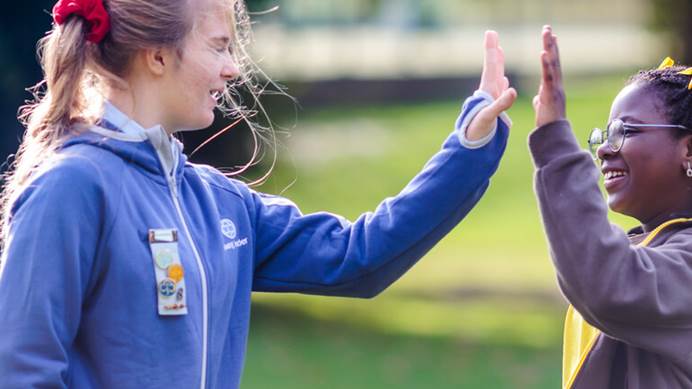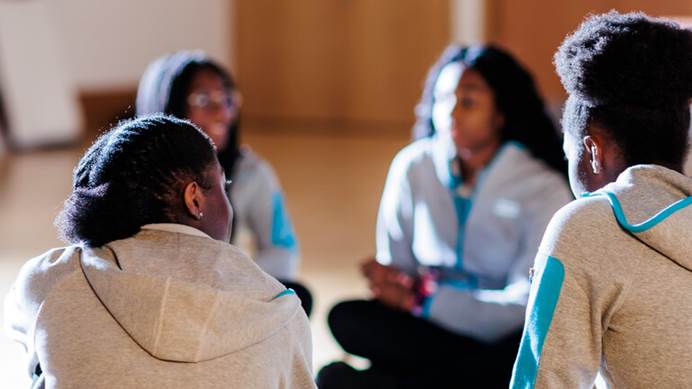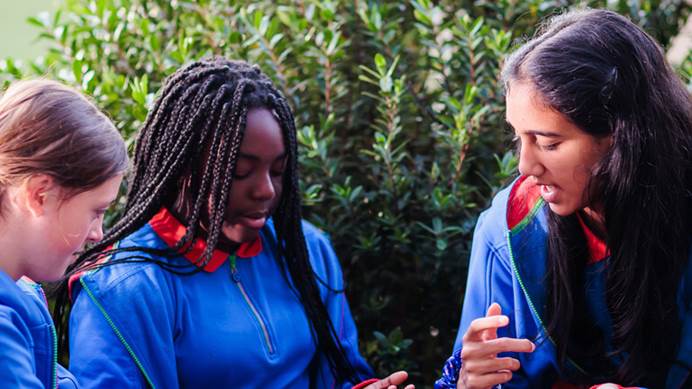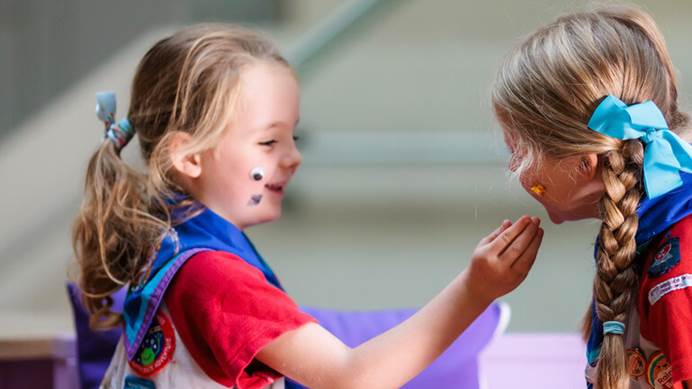Using other people's content
Learn about using copyrighted and trademarked materials correctly
Using material like images, videos or logos is a great way to add to the experience girls get in Girlguiding.
But all published material is covered by the law of copyright.
Permission is generally required before copyright material can be reproduced. And we want to help you make sure you get permission correctly.
Copyright gives the copyright holder exclusive rights to publish, copy, distribute and sell their creation. No one else can use the work without permission. This includes text, logos, illustrations, computer programs, sound and film recordings, broadcasts and sheet music.
If you want to copy published material for a guiding purpose, you need to contact each copyright holder requesting permission to reproduce the material. Getting written permission is the best way to do this. Permission may not be required when:
- An item is out of copyright, for example when the author has been dead for at least 70 years.
- An item is ‘traditional’, for example an old folk song, and you can assume the author has been dead for at least 70 years.
- You're quoting a very small extract as part of a review of the material, research or private study.
Girlguiding content
Reproducing Girlguiding materials
In general, permission is required to reproduce Girlguiding publications, including photocopying and printing. However, Girlguiding gives permission for photocopies to be taken by members of Girlguiding, or their parents, from its publications provided that:
- A member will use it for guiding activities.
- Only a brief extract from the publication is copied – normally this is no more than 2 or 3 pages.
- The publication doesn’t have copyrighted material that Girlguiding has had to get permission to use.
If you need to get permission, email [email protected].
Programme materials are copyrighted by Girlguiding. Visit the programme guidelines and clip art webpage to understand more about how programme assets and materials can be used.
Using Girlguiding trademarks
Girlguiding has protected certain terminology and designs. These are registered trademarks and can’t be used by any manufacturer on any goods for sale without written permission. For more information email [email protected].
Other people's content
Written content
If you want to copy text from an existing publication, you need to provide the following information to the original publisher:
- The exact name of the material and, if it’s an extract, the number of words.
- The name of the author, or authors of the material.
- The name of the book, magazine or other source where the item has been published.
- How many copies will be made.
- If it’s likely the publication will be reprinted. And if so how often, and how many copies will be made at each reprint.
- The type of publication where the material will appear.
- Whether or not the publication will be sold.
- If it’s to be sold, the selling price and the details of who’ll receive the money.
Addresses for most British publishers are given in the Writers’ and Artists’ Yearbook, which might be available at your local library. The author of a collection of works, for example, a poetry collection, might not own the copyright for individual items. In this case, you can usually find their details in the acknowledgements. If there’s no address, the holder can normally be contacted through the publisher.
When producing a publication that uses copyrighted content, proper acknowledgements must always be given. This includes the name of the item, its author, the publisher and, if it’s an article, the name of where it was originally published.
Sometimes acknowledgement text will be given to you by the copyright holder, who will tell you where it must appear.
A copy of the publication where the copyright material appears should be sent to the copyright holder once it has been produced.
Music
If you play recorded music, perform live music or screen music videos in a venue, you need a licence.
You need to check that the premises you’re using for guiding have a licence before doing any musical or performance activities. If you don’t obtain a licence, it might be a breach of copyright.
- Previously you may have had to get 2 separate licenses, but they have come together to form PPL PRS Ltd and now have 1 license called TheMusicLicence.
- Campsites and campfires: you don’t need to purchase a licence for singing traditional campfire songs. However, should more popular music be played or performed we would advise you purchase TheMusicLicence.
- Hymns and church songs: playing and performing hymns and church songs are covered by TheMusicLicence. However if you want to reproduce the words of church songs and hymns in print, you need to apply for a licence from Christian Copyright Licensing.
Performances
If you’re performing a play, contact the original publisher before the event to:
- Get permission.
- Find out how much you need to pay and who to pay it to
- Make sure to let the original publishers know.
- The exact name of the material you’re using.
- The author or authors of the material.
- The date, or dates and description of the event, where it’s being performed, who the audience is, and number of performances at which the publication will be used.
- If tickets will be sold, how much will be made and who’ll receive the money.
Film
When you buy or rent a film to watch at home, the first thing you see on the screen is a copyright notice. It informs you that ‘this film is for home viewing only’ and warns that you will be breaking copyright law if you show it anywhere else. But sometimes you want to watch a film at a unit meeting, at an event or on a trip.
We’ve got a licence with the Motion Picture Licensing Company (MPLC) which allows members to show films without breaking any copyright laws. There are some terms and conditions:
- Films can only be shown to members of Girlguiding and members’ parents.
- You have to buy or rent the film legally.
- You can’t charge any admission fees.
- You can’t advertise or publicise the film screening to the general public.
You can play films as part of a larger event, as long as the films are not screened outdoors, and the event involves no more than 200 attendees. Larger events and outdoor events have to be licensed separately.
This licence covers films produced by many major companies, apart from Warner Brothers and Sony. You need to get your own licence for these. For more advice contact the Independent Cinema Office (ICO).
Checking whether the film you want to show is covered by the licence by calling or emailing the MPLC. Call 01323 649647 or email [email protected]. The list of companies covered changes constantly so it is important to contact MPLC every time you show a film.
You’re responsible for checking the age rating on the film and you must make sure it is appropriate for your unit.



